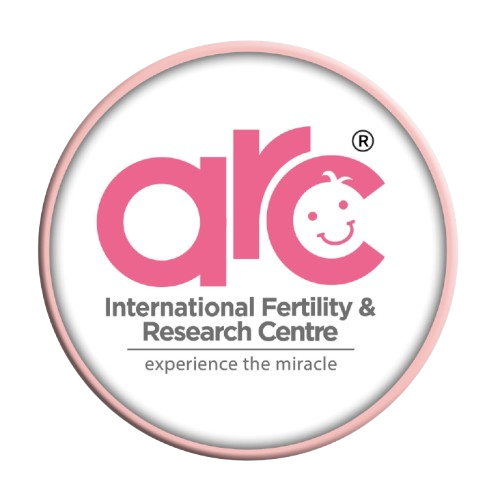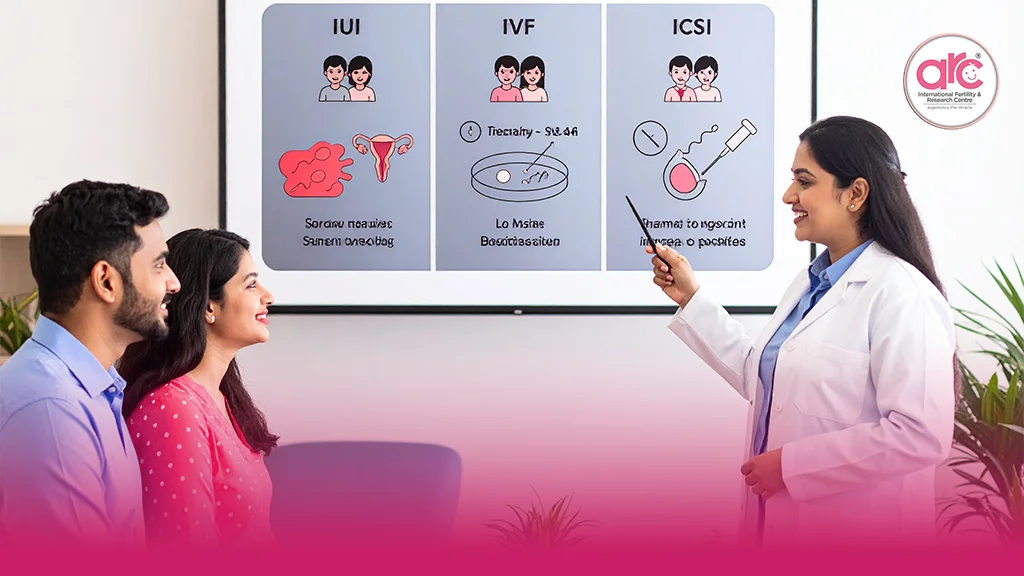Overview
Choosing the right fertility treatment — IUI, IVF, or ICSI — depends on your age, sperm health, and how your body responds to each step. This blog explains the logic behind each option, supported by medical reasoning and honest guidance. Written in a simple language by the doctors at ARC Fertility Hospitals, one of the best fertility hospitals in Chennai, it helps couples make informed, confident decisions.
Age – The First Factor You Cannot Ignore
Fertility is linked to age. That’s not opinion, that’s biology.
For women, egg quality starts to decline after 30. The decline becomes sharper after 35.
For men, sperm quality — count, motility, and DNA strength — starts dipping after 40.
So age decides the strategy.
If you’re young, the body still has natural strength.
If you’re older, science needs to step in more.
When a woman is below 30 and her partner’s sperm health is good, IUI (Intrauterine Insemination) is often the first step.
It’s simple, low-cost, and close to natural conception.
But after 32–33, or if the sperm count is low, IVF gives a better chance.
Because time matters. Eggs don’t wait forever.
Understanding the Three Procedures
IUI is a timed boost.
The sperm is washed, concentrated, and placed directly inside the uterus during ovulation.
It works best when the tubes are open, eggs are healthy, and sperm is reasonably strong.
When the sperm is weak, or previous IUIs have failed, we move to IVF (In Vitro Fertilization).
Here, eggs are collected and fertilized with sperm outside the body.
It allows doctors to choose the best embryos and transfer them into the uterus.
If sperm issues are severe — low sperm count, poor movement, or previous IVF failure — then ICSI (Intracytoplasmic Sperm Injection) becomes the choice.
In ICSI, a single sperm is selected and directly injected into the egg under a microscope.
(You can also read our article IVF vs ICSI – The Key Differences Explained for a detailed view.)
Sperm Health – The Deciding Factor
A man’s sperm health decides half the outcome.
When sperm count and motility are normal, IUI is often enough.
When sperm count is slightly low, or sperm movement is slow, IVF improves the odds.
But if the sperm count is very low, or the shape is abnormal, ICSI becomes necessary.
Many men hesitate to get tested.
They think fertility is only a woman’s concern.
It’s not. In almost 40% of infertility cases, sperm health plays a major role.
So testing early saves time, cost, and emotional energy.
If you’re unsure, start with a semen analysis.
It’s simple, scientific, and saves months of confusion.
You can read our guide on low sperm count for more clarity.
The Real Question – When to Shift from IUI to IVF or ICSI
Here’s the truth: IUI is not a long-term plan.
It’s a stepping stone.
If two or three IUIs fail, and the woman is above 30, move forward. Don’t lose time.
IVF gives more control over fertilization and embryo quality.
If IVF fails and the sperm quality is poor, shift to ICSI.
Each step has its place. But staying too long at one step is a mistake.
That’s why it’s important to understand your chances.
You can read IUI vs IVF Success Rate Explained for data-based comparison.
A Simple Way to Decide
Let’s simplify.
| Condition | Recommended Option |
|---|---|
| Woman under 30, healthy tubes, normal sperm | IUI |
| Woman 30–35, average sperm or previous IUI failure | IVF |
| Woman above 35, low sperm count, or poor sperm motility | ICSI |
Science works best when time and logic guide it.
The Honest Truth – It’s Not About Technology Alone
People often ask, “Which treatment gives 100% success?”
The answer is — none.
What matters is the right match between your body and the treatment.
The expertise of your doctor.
The lab quality.
The ethics of your hospital.
That’s why couples trust ARC — the best fertility hospital in Chennai.
We don’t sell dreams. We share truth.
We match medical logic with personal care.
The Final Word
If you’re deciding between IUI, IVF, or ICSI — start by checking your facts.
Know your age. Know your sperm health. Know your options.
Science is not emotional. It’s logical.
But behind that logic is a dream — to hold your baby with pride.
That dream deserves clarity, not confusion.
So don’t rush. Don’t delay.
Ask questions. Get tested. Then choose with reason.
At ARC Fertility Hospitals, our goal is simple — give you the right treatment, at the right time, with the right intent.
Because in fertility, as in life, truth is the best medicine.




